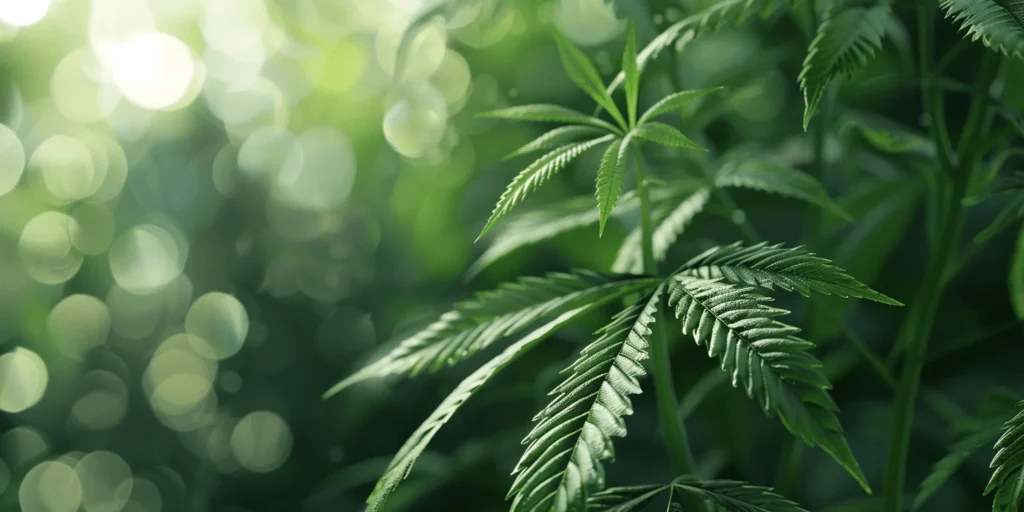When inquiring “What is CBD,” it’s essential to understand its unique benefits and the impact CBD is having in the health and wellness industries. Cannabidiol (CBD), discovered in 1940, is one of over 100 cannabinoids present in hemp plants. It can constitute up to 40% of the plant’s extract and is recognized for its potential therapeutic benefits without the psychoactive effects associated with THC.
Data from 2023 suggests that Europe accounts for 31% of the global CBD market share and is still in the initial stages of development. Also, recent surveys indicated that approximately 30% of adults in Europe have experimented with or are interested in trying CBD products. This growing consumer interest suggests a robust opportunity for expansion in the CBD market.
Entrepreneurs and investors should particularly note the versatile applications of CBD – from improving mood and reducing pain to its incorporation in innovative products like CBD-infused activewear.
The legal status and non-psychoactive nature of CBD enhance its popularity across many European countries, reinforcing why understanding “What is CBD” is crucial for business success in this sector.
What is CBD?
So, what is CBD and where does it come from? CBD, or cannabidiol, is a non-psychoactive compound found in the Cannabis sativa plant. Unlike THC – another well known cannabis compound, CBD is utilized primarily for its potential therapeutic benefits in wellness products.
Unlike THC, CBD does not cause a “high” making it an appealing option for therapeutic use without psychoactive effects. Although cannabis-derived CBD is noted for its potency, industrial hemp-derived CBD also offers numerous health benefits and is more widely available, especially in regions where cannabis is not legalized.
Over 80 cannabinoids are identified within the Cannabis sativa plant, but CBD is primarily extracted from hemp, which contains minimal THC levels. This extraction process ensures that CBD can influence brain chemicals without the intoxicating effects of THC, making it legally and commercially viable across various European markets where regulations might restrict cannabis use.
How is CBD made?
To answer this question, you first need to familiarize yourself with the CBD extraction process which is crucial for producing high-quality CBD products.
CBD oil in Europe must be extracted from ‘industrial hemp’ grown under legal standards that ensure the plants contain less than 0.2% THC, adhering to EU regulations. This cultivation process emphasizes high CBD content rather than THC, aligning with legal and consumer safety standards.
There are at least three different CBD oil extraction methods, but one of the most effective and commonly used is CO2 extraction. During CO2 extraction, hemp is placed in a chamber filled with carbon dioxide, which, under pressure, transforms into a liquid state, absorbing the hemp’s oils and flavors. The mixture of CBD and carbon dioxide is then transferred to a final chamber where the CO2 reverts to a gaseous state, leaving behind pure CBD oil featuring many health benefits.
This CBD oil extraction method is often preferred for its efficiency and ability to produce a clean, highly concentrated CBD oil, making it particularly tempting for those looking to invest in the highest quality CBD products.
Cannabinoids and the endocannabinoid system (ECS)
To put it simply, CBD and other cannabinoids like THC, CBN, CBG, CBC interact with the body’s endocannabinoid system (ECS), which regulates functions like mood, sleep, and appetite. This system’s receptors respond to the presence of cannabinoids, influencing various physiological processes and potentially enhancing overall wellbeing.
What are cannabinoids
Cannabinoids are natural compounds present in the Cannabis sativa plant – scientists have already identified more than 100 different cannabinoids. The most famous cannabinoid is delta-9-tetrahydrocannabinol (Δ9-THC), known for its psychoactive properties. CBD, another most popular cannabinoid, is believed to have anti-anxiety benefits that may ease the psychoactive effects of THC and is widely known for its many other health benefits.
Cannabinoids are primarily distinguished by their psychoactive effects. For instance, CBG, CBC, and CBD are not psychoactive, whereas THC, CBN exhibit varying levels of psychoactivity.
Cannabinoids produce their benefits by engaging with specific cannabinoid receptors located on cell surfaces. These receptors, predominantly found throughout the central nervous system, are categorized mainly into two types: CB1 and CB2.

What is the endocannabinoid system
Exploring “What is CBD” reveals its critical interaction with the endocannabinoid system (ECS), a complex cell-signaling system identified by the scientists in the early 1990s. ECS regulates essential body functions such as sleep, mood, appetite, and memory – all areas where CBD oil has shown potential benefits. In other words, CBD supports the ECS by enhancing the body’s natural processes.
The exact mechanisms through which CBD oil and the endocannabinoid system operate remain somewhat unclear, but CBD oil is believed to potentially activate or inhibit the cannabinoid receptors CB1 and CB2 found in the ECS.
CBD interacts with cannabinoid receptors CB1 and CB2 located throughout the central nervous system more subtly than THC does. This interaction can influence various bodily functions, from altering memory and cognition to affecting pain perception and the body’s reward and pleasure responses. Understanding these dynamics is crucial for those aiming to tap into the therapeutic benefits of CBD and other cannabinoids.
What is the entourage effect
The entourage effect, a term first introduced by the pioneering Israeli chemist Raphael Mechoulam, sheds light on what is CBD’s role within the broader context of cannabis compounds. The entourage effect suggests that the various compounds found in the hemp plant, e.g. terpenes and flavonoids, including CBD and other cannabinoids, work better together, enhancing the CBD’s overall therapeutic benefits. For those who want to enter the CBD market, understanding the entourage effect is crucial, as it highlights the potential for full-spectrum CBD oil products that retain a variety of hemp compounds, which could offer superior health benefits.
What are the different types of CBD
Understanding the different types of CBD – full spectrum CBD, broad spectrum CBD, and CBD isolate – is crucial before making informed business decisions. Different types of CBD offer distinct benefits and fit specific needs, whether you’re seeking CBD oil with all cannabinoids or just cannabidiol alone.
What is broad spectrum CBD
So, what is broad spectrum CBD? This variant of CBD oil, unlike full spectrum CBD or CBD isolate, offers a unique composition. Broad spectrum CBD oil includes a range of cannabinoids and terpenes found in the hemp plant, such as cannabichromene (CBC), cannabinol (CBN), and aromatic terpenes like myrcene and limonene.
However, broad spectrum CBD notably excludes THC, making it an excellent option for those who wish to avoid even the smallest amount of THC while still benefiting from other hemp-derived compounds. Broad spectrum CBD strikes a balance, providing a robust profile of beneficial cannabinoids without the trace of THC found in full spectrum products. This makes it particularly suitable for consumers in regions with strict THC regulations or for individuals who wish to avoid THC at all, e.g. pregnant or breastfeeding women and professional athletes.
Moreover, its diverse cannabinoid content may enhance therapeutic benefits through the “entourage effect,” where the combined effect of hemp’s compounds is greater than the sum of its parts.
What is full spectrum CBD
Full spectrum CBD oil is well-known for its comprehensive range of cannabinoids, including CBD, CBG (cannabigerol), CBN (cannabinol), as well as terpenes and flavonoids.
Full spectrum CBD oil is considered the most efficacious due to the ‘entourage effect’ that you’ve already heard about – a phenomenon where the combined presence of cannabinoids and other compounds enhances the overall benefits of the oil. The synergistic interaction among these compounds can lead to a more potent impact on the body, maximizing the benefits of CBD oil.
Full spectrum CBD oil is also the most natural form of CBD available because it undergoes minimal processing, preserving all the beneficial elements of the hemp plant. While it does contain trace amounts of THC, advancements in extraction technology ensure that these levels remain below 0.2%, adhering to legal standards in many European countries. This trace level of THC enhances the entourage effect without causing psychoactive effects, making full spectrum CBD oil a powerful option for enhancing wellness.

What is CBD isolate
You may wonder what CBD is in its purest form. CBD isolate represents the most precise state of cannabidiol, boasting a purity level of 99%.
This type of CBD is created by precisely removing all other active compounds found in the hemp plant, including other cannabinoids, terpenes and flavonoids. As a result, CBD isolate does not produce the ‘entourage effect’ seen with full-spectrum and broad spectrum CBD products, where multiple compounds work synergistically to enhance overall efficacy.
However, the absence of THC makes CBD isolate an optimal choice for professional athletes, pregnant women, and even pets. Additionally, its lack of distinct taste and aroma, coupled with its water-soluble properties, makes CBD isolate highly versatile for incorporation into a variety of CBD edible products such as chocolates, gummies, and cookies. This adaptability and purity make CBD isolate a valuable commodity in the CBD market, appealing to consumers seeking the most simple form of CBD without additional compounds.
The evidence for CBD health benefits
Scientific studies suggest that CBD may offer many health benefits, potentially helpful in areas such as anxiety, sleep, pain management, and inflammation, opening new avenues for product development and investment in the fast growing CBD market.
It is also worth knowing that strong scientific proof exists for CBD’s effectiveness in treating severe childhood epilepsy syndromes, such as Dravet syndrome and Lennox-Gastaut syndrome. These conditions often resist traditional antiseizure medications, but studies have shown that CBD oil can significantly reduce seizure frequency and.
Medications with CBD like “Sativex” have gained attention in Europe, reflecting growing regulatory acceptance, and it marks a shift towards embracing CBD-based treatments in mainstream medicine.
Anxiety
Ongoing studies and clinical trials increasingly support the approach that CBD oil and other CBD products may help alleviate anxiety symptoms. CBD interacts with the body’s ECS, regulating mood and emotional responses. The interest in CBD oil as a natural alternative for anxiety relief is growing among consumers and health professionals alike. This not only highlights CBD’s therapeutic benefits but also signals promising market opportunities for those interested in CBD products aimed at improving mental wellness.
Insomnia
Recent research indicates that CBD may promote better sleep by addressing underlying issues like chronic pain and anxiety, which often disrupt sleep patterns. By potentially modulating pain perception and reducing anxiety, CBD oil could help users not only fall asleep more easily but also enjoy uninterrupted sleep. This connection positions CBD as an attractive option for those seeking natural remedies, presenting a profitable niche for entrepreneurs in the wellness sector.
Chronic pain
Human studies increasingly confirm that CBD can be effective in managing pain. Notably, research published in the European Journal of Pain indicates that topical CBD application may reduce arthritis-related pain and inflammation. Furthermore, CBD is recognized for its potential to ease both inflammatory and neuropathic pain, which are notoriously challenging to treat. These findings highlight CBD’s therapeutic benefits, enhancing its appeal to consumers and business representatives looking for effective, natural pain relief solutions.

Is CBD safe?
While CBD is recognised for its therapeutic benefits, it can also cause slight side effects such as nausea, dry mouth, and drowsiness. Importantly, CBD may affect the metabolism of certain medications by inhibiting the liver enzymes that break them down, similarly to the effect grapefruit has on these enzymes. This interaction is crucial for those on medications like blood thinners or anti-epileptics, which require stable blood levels.
Side effects of CBD
The most common side effects of CBD oil are outlined below and include drowsiness, gastrointestinal disturbances, dry mouth and nausea.
Drowsiness
Drowsiness ranks among the most frequently observed side effects of CBD. Interestingly, this effect is also viewed as a benefit for individuals seeking relaxation or help with sleep. However, the sedative effects of CBD oil may be intensified when taken alongside other sedating medications.
Gastrointestinal Issues
Among the common side effects of CBD oil and other CBD products are gastrointestinal disturbances such as stomach upset. Additionally, there are concerns about CBD oil’s impact on liver health. For instance, clinical trials involving Epidiolex, a CBD-based medication for seizures authorized in the US, have indicated a potential risk for elevated liver enzymes, which may cause liver damage.
Dry Mouth
Commonly known as “cotton mouth”, this side effect of CBD oil can also occur in some people. Research indicates that CBD’s influence on the endocannabinoid system may disrupt saliva production, leading to this discomfort.
Nausea
According to experts, nausea can occur when taking CBD oil, particularly if one is sensitive or consumes high amounts of CBD. The absorption and effects of CBD can vary significantly with different products like CBD oils, CBD gummies, or CBD vapes.
Is CBD legal?
In European countries where CBD oil is legal, the regulations of THC content in it exists. For example, in Norway and Sweden, only CBD products completely free of THC are legal. This reflects a diverse regulatory environment across Europe, where each country may have different restrictions concerning CBD oil legality. Those wanting to enter the CBD market should stay informed about these regulations to navigate the market effectively and ensure compliance.
Here’s a table showing CBD oil’s legality in different European countries:
| Country | THC level | CBD oil status |
| Lithuania | < 0.2% | Legal |
| Latvia | < 0.2% | Legal |
| Estonia | < 0.2% | Legal |
| Poland | < 0.3% | Legal |
| Finland | < 0.2% | Legal |
| Sweden | THC-free | Legal |
| Norway | THC-free | Legal with medical prescription |
| Spain | < 0.2% | Legal |
| Portugal | < 0.2% | Legal |
| Italy | < 0.6% | Legal |
| France | < 0.3% | Legal |
| Germany | < 0.2% | Legal |
| Netherlands | < 0.05% | Legal |
| Austria | < 0.3% | Legal |
| Switzerland | < 1% | Legal |
| Czech Republic | < 0.3% | Legal |
The bottom line
To sum up, CBD is a natural compound found in hemp, a plant that has been used in medicine for thousands of years. Today, CBD’s therapeutic benefits are being recognized and validated by global researchers and many customers around Europe. Research confirms that CBD can be a safe and effective treatment for anxiety, insomnia, and chronic pain, though its interactions with other medications and the precise effective dosages still require further study.
Currently, Europe holds a significant portion of the global CBD market share, with continued growth expected as regulatory landscapes evolve favorably. This growing sector offers big opportunities for entrepreneurs, particularly in areas like health and wellness products, where demand for natural and effective alternatives to traditional medicine is increasing. Starting a CBD business in Europe now could be profitable as it allows entry into a growing market, setting the stage for significant gains as the market develops and more consumers get involved.

Blog Home
No Content